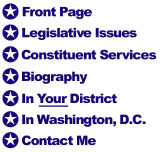


|
Passing a Patients' Bill of Rights and Providing Health Care Access Patients’ Bill of Rights One of the reasons I ran for Congress was to work for a Patients’ Bill of Rights that guarantees medical decisions will be made by patients and doctors—not bureaucrats. So many families, including my own, have been placed in limbo when a family doctor orders medically necessary treatment, only to be delayed or overruled by an unaccountable HMO bureaucrat. I have told many times the story of my wife Stephene, a nurse. She was denied treatment deemed medically necessary by her doctor of many years. The person who denied her treatment was an HMO bureaucrat in California who had never seen my wife and knew only about her what he was told by our family doctor. After a long battle with our doctor, the insurance company finally relented. Luckily, Stephene and I had a caring physician as well as the time and resources to fight the HMO, but many others are not so fortunate, or are faced with emergency situations. When I ran for Congress, I found out that problems like this are much more prevalent than I had ever thought. For example, one mother had a daughter who was refused a cancer treatment because it was "experimental," even though it had a better success rate than other approved procedures. Another man told me that his family lost their health insurance when his employer switched health plans and the new insurer refused coverage. I’ve even heard from a doctor who was offered a bonus by an insurer if he wouldn’t refer patients to the hospital. Now that I am a Member of Congress, I am working to ensure that my constituents don’t have to fight to ensure that they get the care promised in their contracts. Further, I believe that if a health insurer denies or delays care that causes physical harm or death to a person, I believe that the company should be held responsible for its actions. I am a cosponsor of H.R. 2563, the Bipartisan Patient Protection Act. This legislation, which is supported by more than 700 organizations representing physicians, patients and consumers will ensure timely access to high quality health care for all 161 million Americans with health insurance coverage. A short summary of the protections provided by H.R. 2563:
H.R. 2563 was brought up in the House of Representatives on August 2, 2001. Unfortunately, a "poison pill" amendment was adopted by the House that made it impossible for me, or most of the other sponsors of the legislation, to support final passage of the bill. This amendment made it virtually impossible for any patient injured or killed as a result of delay or denial of care to ever be able to hold an HMO or other managed care insurer legally accountable for negligent, harmful, or deadly actions. In addition to stripping the accountability language of H.R. 2563, the amendment preempted strong state laws already in place. Although I was greatly disappointed by the bill that passed the House, I am working with other supporters of true patient protection legislation to ensure a vote on the real Patients’ Bill of Rights is taken in the House before the end of the year. I believe in, and I hope the House will take up, legislation that will ensure that doctors and patients – not HMOs and insurance companies – make vital medical decisions.
The Uninsured in America Forty-two million people in our country are uninsured, which negatively affects health status, access to care and financial security. The uninsured are more likely to delay doctor visits, delay needed care or choose not receive that care at all. Twenty percent of the uninsured say that they needed, but did not get, recommended treatment last year. When the uninsured do get to the doctor, they are more likely to not fill the recommended prescription. Delaying, or not receiving health care treatment, can lead to more serious health problems. The uninsured are more likely to be hospitalized for avoidable conditions, such as pneumonia or uncontrolled diabetes. In addition to health consequences, the financial burden can be severe. Debt due to high, unexpected medical bills is one of the primary reasons that families file for bankruptcy. Our health care safety net -- community clinics and public hospitals -- is straining under the burden of caring for uninsured Americans. Safety net providers, despite their good work, cannot take the place of quality health management and health insurance. Recent studies have shown that the majority of the uninsured are working adults with families. Additionally, the statistics show us that, overwhelmingly, low income workers in small businesses (less than 25 employees) are the most likely people to be uninsured. Employers are eager to offer health insurance, but they have difficulty affording it, especially in the first ten years. Small employers report that they would utilize a tax incentive program to help pay for the cost of health insurance. To address this national problem, I have introduced legislation that will target federal dollars to the people who need it most – the self-employed and employees of small businesses. This bill has been endorsed by the Blue Dog Coalition of conservative, fiscally responsible Democrats. H.R. 2082, the Small Business Health Insurance Availability Act of 2001
|
Copyright © 2000 Congressman Dennis
Moore